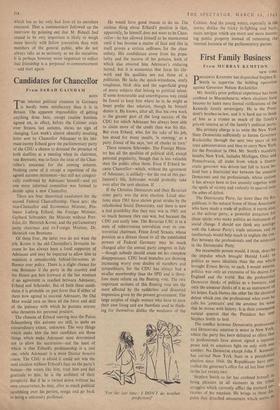Candidates for Chancellor
From SARAH GAINHANI
BONN FT RE internal political situation in Germany I is hardly more satisfactory than it is in Britain. The apparent impossibility of getting anything done here, except routine business agreed on, in effect, before the Cabinet crisis over Strauss last autumn, shows no sign of changing. Last week's almost absurdly insulting letter sent by Chancellor Adenauer to his inti- mate enemy Erhard gave the parliamentary party of the CDU a chance to demand the presence of both duellists at a meeting when its chairman, von Brentano, was to force the issue of the Chan- cellor's successor for the coming autumn. Nothing came of it except a repetition of the agreed autumn retirement—but still not categori- cally confirmed by Adenauer himself—and yet one more informal committee was formed to decide upon a new Chancellor.
There are four theoretical candidates for the second Federal Chancellorship. These are: the vice-Chancellor and Economics Minister, Pro- fessor Ludwig Erhard; the Foreign Minister, Gerhard Schroeder; the Minister without Port- folio, Dr. Heinrich Krone; and the parliamentary party chairman and ex-Foreign Minister, Dr. Heinrich von Brentano.
Of these four, the latter two do not want the job. Krone is the old Chancellor's favourite be- cause he has always been a loyal supporter of Adenauer and may be expected to allow him to maintain a considerable behind-the-scenes in- fluence over policy. There is a slight chance for von Brentano if the party in the country and the House put him forward at the last moment if no agreement is reached between Adenauer, Erhard and Schroeder. But of both these candi- dates it is probable on past form that if either of them now agreed to succeed Adenauer, the Old Man would turn on them all the force and skill of the jealousy with which he pursues anyone who threatens his personal position.
The chances of Erhard moving into the Palais Schaumberg this autumn are still, to quite an extraordinary extent, unknown. The very things which make him the best candidate are those things which make Adenauer most determined not to allow his succession—not the least of which is that Erhard's professorship is a real one, while Adenauer is a mere Doctor honoris causa. The CDU is afraid it could not win the next election without Erhard's face on the party's banner—the voters like him, trust him and feel gratitude to him; he is the architect of their prosperity. But if he is turned down without his own concurrence, he may, after so much political squabbling over his person, resign and go back to being a university professor. He would have good reason to do so. The curious thing about Erhard's position is that, apparently, he himself does not want to be Chan- cellor—he has allowed himself to be manoeuvred until it has become a matter of face and this in itself proves a certain unfitness for the chan- cellory. His candidature arose from his popu- larity and the success of his policies, both of which also ensured him Adenauer's enduring hatred; but it is economics that form his life- work and his qualities are not those of a politician. He lacks the quick-wittedness, steely toughness, thick skin and the superficial grasp of many subjects that belong to political talent. If some honourable and unambiguous way could be found to keep him where he is, he might at heart prefer that solution, though he himself denies it. He knows, after all, that his own work is the greater part of the long success of the CDU for which Adenauer has always been able to claim more of the credit than was his due. But even Erhard, who, for the sake of his job, has stood for many insults, 'is running,' as a party friend of his says, 'out of cheeks to turn.'
There remains Schroeder. The Foreign Minis- ter has all the qualities of political skill, except personal popularity, though that is less valuable than the public often think. Even if Erhard be- came Chancellor—which, without the agreement of Adenauer, is unlikely—for the rest of this par- liament's life, Schroeder would probably take over after the next election. If . . .
If the Christian Democrats and their Bavarian sister party win the next election. Local elec- tions since 1961 have shown great strides by the refashioned Social Democrats, and there is now a real possibility that they may win in 1965; not so much because they can win, but because the CDU can easily lose. The Bavarian CSU is in a state of subterranean convulsion over its con- troversial chairman, Franz Josef Strauss, whose position as a distant threat to all the established powers of Federal Germany may be much changed after the annual party congress in July —though nobody should count on his complete disappearance. CDU local branches are showing increasing worry over doubts of members and sympathisers, for the CDU has always had a smaller membership than the SPD and is there- fore more reliant on the floating vote. The two important sections of this floating vote are the most affected by the rudderless and disunited impression given by the present government. The large surplus of single women who have to earn their own living and are therefore used to think- ing for themselves dislike the weakness of the 'For the last time : I DON'T do weather predictions!'
Cabinet. And the young voters, especially in the towns, dislike the tricky in-fighting and back- stairs intrigue which are more and more becom- ing public property instead of remaining the internal business of the parliamentary parties.


































 Previous page
Previous page